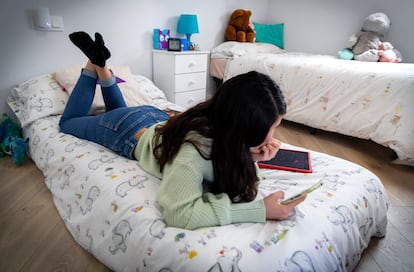At what age should a teenager be given a cell phone?
The debate about when to give kids their first smartphone is growing among parents and experts, but there are no clear solutions. Three researchers point out the key aspects

“I recently attended a forum on screens and adolescence,” says Gemma Martínez, a researcher with the EU Kids Online network at the University of the Basque Country (Spain). “I perceived a new wave of concern focused on the risks of minors; there wasn’t a single moment of discussion about the opportunities that new technologies provide.” This new wave has taken the form of a huge movement with parents organizing in WhatsApp and Telegram groups, US prosecutors suing Meta for “profiting from children’s pain,” concern sparked by news about the teenagers’ anarchic group chats and experts that insist that cell phones are an unspeakable danger for young people.
A smartphone brings new risks; that much cannot be denied. The real world is full of risks and phones are an inevitable part of that. Leen d’Haenens, a member of the academic group ySkills, funded by the European Union, which aims to strengthen the digital skills of young people, explains: “Our research at ySkills reveals two notable findings. One, that possessing advanced digital skills often leads to riskier online behaviors. Two, that despite being very competent in matters like searching for information, communicating or creating content, it is not easy for these young people to steer clear of contents and contacts that pose threats to their mental well-being.”
In this context, anyone who wants to define cell phones as a risk has evidence in their favor. The thing is that a complete ban also brings problems. In Europe, there are two large research groups that study the digital experiences of minors and their families: EU Kids Online, founded in 2006, with academics from 34 universities across the continent, with Sonia Livingstone – perhaps the greatest global expert in the sector – at the helm. EU Kids has a global chapter as well as a European one, more focused on skills: ySkills, made up of 16 institutions. EL PAÍS spoke with three experts from both groups.
1. What is the right age?
The big question about the proper age to give them their first phone is a persistent debate that has no answer. “You cannot generalize,” says d’Haenens. “Parents should base their decision on individual circumstances and the child’s readiness for the responsibilities that come with a cell phone.”
Ellen Helsper, a digital inequality researcher at the London School of Economics and member of Global Kids Online, puts into words one of the great unspoken truths around this debate: “Being a parent is not easy.” She adds: “A 15-year-old kid can be very different from another 15-year-old kid; there is no one-size-fits-all solution.”
2. Some practical criteria
Although there is no specific, universal age to own a phone with internet access, there are some clues to assess each case; four, according to d’Haenens. One: maturity, to see if the child can manage screen time, online security and privacy. Two: communication needs – is a cell phone necessary to talk to family or friends? Three: educational purposes, if they work with apps at school, need to research things online or have tasks that require a connection. Four: physical security, to be able to communicate with them in case of trouble.
These four criteria must be complemented by parental control options that can be negotiated with the minors, from technological tools like apps to monitor their use to an open, constant communication. “Setting rules and limits around screen time and content is crucial to promote healthy habits,” says d’Haenens.
3. Is it easier to simply not give them a phone?
Nothing is written in stone. Many families prefer to postpone the moment of giving them a phone and have strict internal rules about the use of screens at home. They have a strategy and share it with their children, although their opinion is not always taken into account.
Although it keeps them away from the dangers of mobile phones, this exclusion adds other risks: “Completely excluding a child from using mobile phones depends on individual circumstances and parenting philosophy,” says d’Haenens. “In general, a balanced approach is preferable for most families.”
4. The problem does not go away at 16
The intention of the parents who do not want to give their children a cell phone at 12 is not to keep them away from one forever. There is some consensus that 16 is a good age. However, those four years do not go by in a vacuum.
It is true that this eliminates risks as well as possible opportunities, but it also ignores the needs of the teenager. “There is a risk – as with everything at that age – that the prohibition will lead young people to access content in different ways, without supervision, and to receive ideas from less informed peers, to start hiding things from adults, which could potentially have very negative consequences,” explains Helsper.
For the specialist, the answer lies in something called active mediation: “This has proven to have a positive impact on young people, by avoiding harm from risks while allowing them to take advantage of opportunities.” Because waiting until they are 16 can cause unforeseen dramas: “Restricting and forbidding prevents young people from understanding the threats, and puts them at greater risk of harm when they finally begin to interact with technologies.”
5. The “hot potato” of mothers and fathers
The difficult decision of whether or not to a give cell phone to a teenager falls on the parents, but the responsibility for the way they use it depends on many uncontrollable, distant factors, such as the algorithms of the large platforms, the appropriate use that schools make of the tools, the intrusion into their privacy by the data industry, the messages from harassing adults or the easy access to adult content.
The limitation of these problems depends on government and school legislation. Martínez has dubbed this problem the “hot potato.” The administration, parents and schools face a challenge with cell phones, and no one is coming up with a solution. “The teachers are way in over their heads right now,” says Martínez. “They get a lot of problems of this type, cyberbullying, sexual images. They say that they can’t take it anymore, that this is a family problem and if they don’t start educating them at home, what are they expected to do?” This gap in responsibility is the “hot potato.”
The solutions are complex: because the consequences take too long, as in legislation, and because knowing exactly what to do is a hassle for the families. “I recently participated in a national campaign aimed at families. We invited 50-70 parents of a medium-high socioeconomic status in secondary education institutes in Madrid. How many came? Two,” Martínez laments. These campaigns aim to mitigate fears, but they do not seem to be crystallizing.
6. The apocalypse in the news
Amid the media turmoil, the stories of digital calamities work quite well, both about unusual real cases and from experts with strong opinions. The world that these news reflect causes understandable fear: “Reading all these headlines also scares me,” says Martínez.
“When I look at the media and I see the parallel world in which I am working, I wonder how to make ourselves heard. Until now, when we had an interview, we used to say ‘Yawn, they will probably end up using such and such headline,’ but the time has come to act,” she adds.
In this void, there are people who detect interest and see room to grow, with research that may have biases or prejudices. “There are pseudo-researchers who very subjectively interpret data and release it to the media and can spoil the serious work that others do,” Martínez complains. A repeated criticism is that using the cell phone often harms physical activity, but there is no evidence of this. “Our ySkills research, based on a three-wave longitudinal survey, did not reveal a correlation between digital use and decreased physical health,” says d’Haenens.
7. The comparison with alcohol
Many parents who want to delay the cell phone age compare it with products that are restricted for those under 18 years of age, such as drugs, alcohol or cars.
The experts believe that this comparison is wrong. “It is not comparable to drugs or alcohol, which can have detrimental physiological effects on the brain development of young people. Their use is also problematic for adults who consume drugs and alcohol excessively or who don’t have a driving license. Taking away their cell phones is more like not letting young people walk or ride a bike alone on the street,” says Helsper.
A more reasonable comparison would be sugar, she points out. “Certain apps or contents could be equivalent. Parents will restrict what children eat so they are not exposed to too much junk food or sugary drinks, but they will not stop them from eating healthy things or drinking water.”
The complexity of distinguishing between sugary drinks and water is not easy in the case of cell phones. For that, one has to pay close attention, talk with the teenagers and take an interest in their social life. “The world we live in is inherently digital, and excluding kids from it will make them lose crucial digital literacy skills they need to become intelligent, critical citizens,” concludes d’Haenens.
Sign up for our weekly newsletter to get more English-language news coverage from EL PAÍS USA Edition
Tu suscripción se está usando en otro dispositivo
¿Quieres añadir otro usuario a tu suscripción?
Si continúas leyendo en este dispositivo, no se podrá leer en el otro.
FlechaTu suscripción se está usando en otro dispositivo y solo puedes acceder a EL PAÍS desde un dispositivo a la vez.
Si quieres compartir tu cuenta, cambia tu suscripción a la modalidad Premium, así podrás añadir otro usuario. Cada uno accederá con su propia cuenta de email, lo que os permitirá personalizar vuestra experiencia en EL PAÍS.
¿Tienes una suscripción de empresa? Accede aquí para contratar más cuentas.
En el caso de no saber quién está usando tu cuenta, te recomendamos cambiar tu contraseña aquí.
Si decides continuar compartiendo tu cuenta, este mensaje se mostrará en tu dispositivo y en el de la otra persona que está usando tu cuenta de forma indefinida, afectando a tu experiencia de lectura. Puedes consultar aquí los términos y condiciones de la suscripción digital.









































